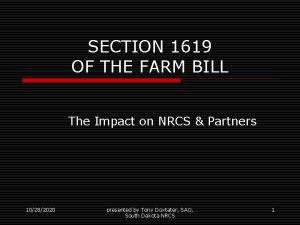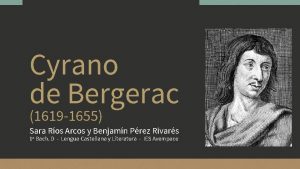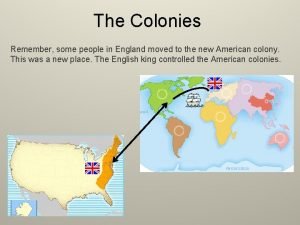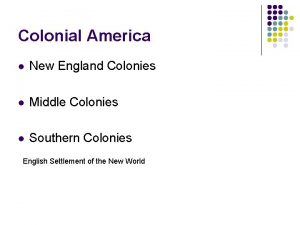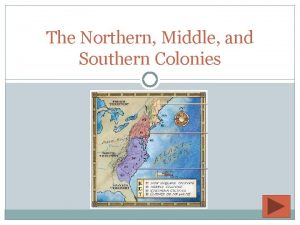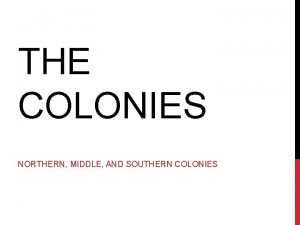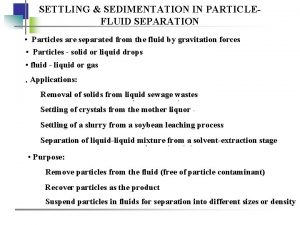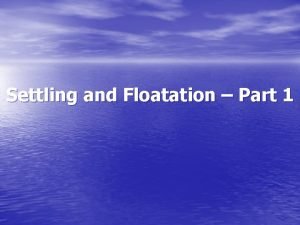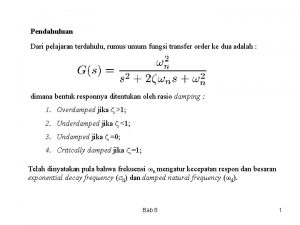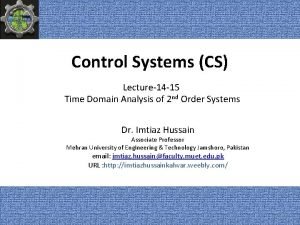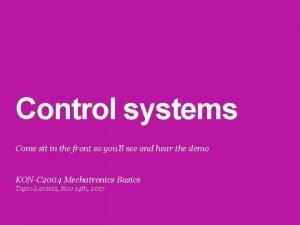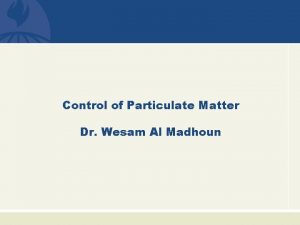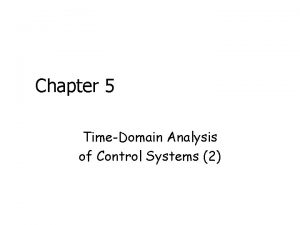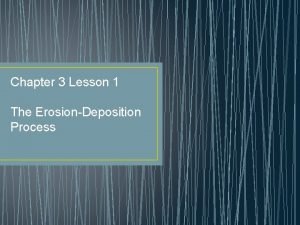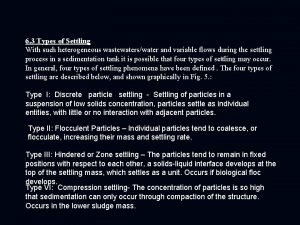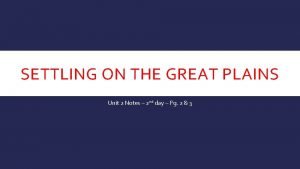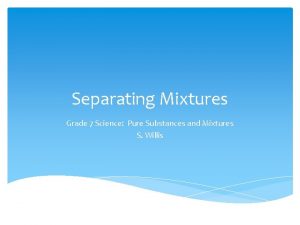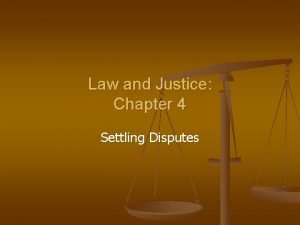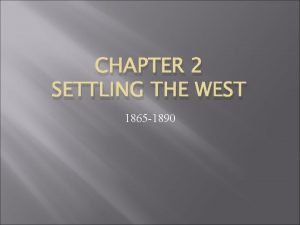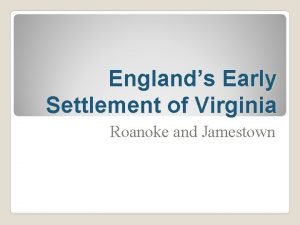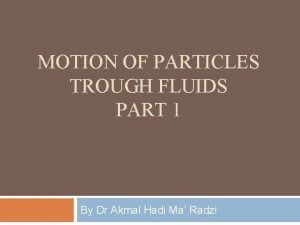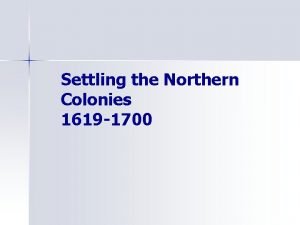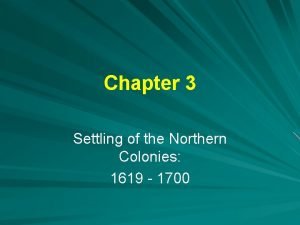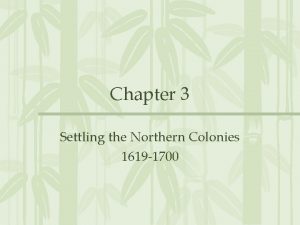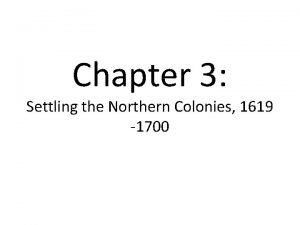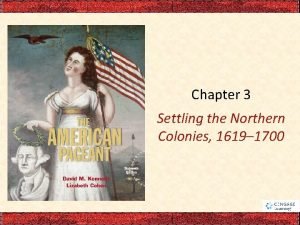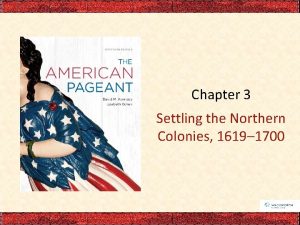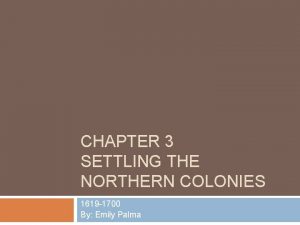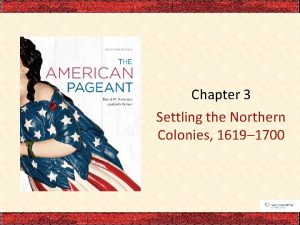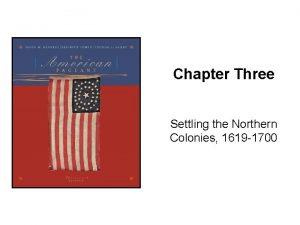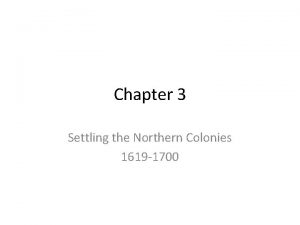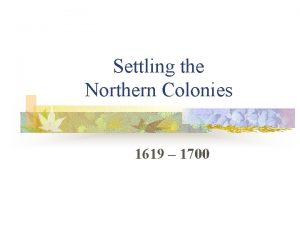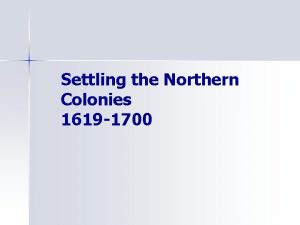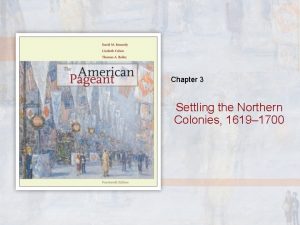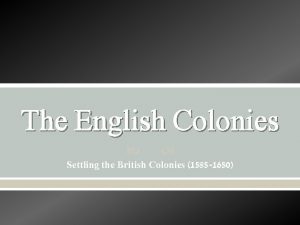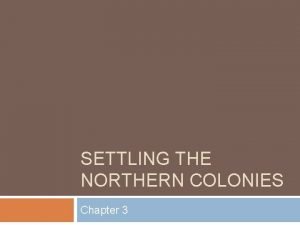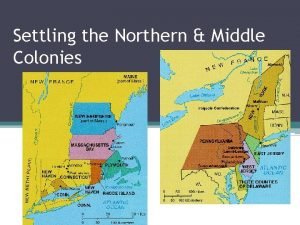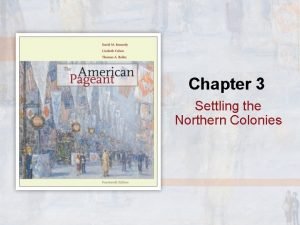Ch 3 PPT Settling the Northern Colonies 1619










































- Slides: 42

Ch. 3 PPT Settling the Northern Colonies 1619 -1700

Background • Henry VIII broke away from the Catholic Church - made himself the head of the Church of England which stimulated Puritanism. • Puritans: English religious reformers who wanted total purification of English Christianity – to de-catholicize Church of England (eliminate rituals and creeds) • Subgroup of most devout Puritans formed called Separatists. They vowed to break away from the Church of England.

Pilgrims • “Separatists, ” (Pilgrims) hated by James I because he believed they might defy his political authority. • 1608: many Separatists moved to Holland to escape persecution. • After a while, they became concerned with the “Dutchification” of their children. • They negotiated with the Virginia Company to settle in the “New World. ”

Pilgrims Cont. • 1620: Set sail in the Mayflower to Virginia area, but ship went off course and arrived on coast of New England. • Surveyed the land, then settled at Plymouth Rock on Plymouth Bay as squatters. • 102 settlers – less than half were Puritan Separatists.

Mayflower Compact • • • Document of laws to form a simple government Wanted to advance the Christian Faith Promised all due submission and obedience Submit to the will of the majority. A step toward genuine self-government. Adult male settlers met in town meetings to make their own laws.

Colony of Plymouth 1 st winter (1620 -21) was harsh: 102 that came only 44 survived. • Set the tone for religious freedom, unlike their Mother Country, England. • William Bradford: governor elected 30 times. • Plymouth merged with the Massachusetts Bay Colony.

Massachusetts Bay Colony • 1630: Eleven ships with 1, 000 settlers started the new colony. • 1630 s: “Great Migration” - about 70, 000 refugees left England – 20, 000 Puritans went to Massachusetts, and about 48, 000 to the West Indies. • More Puritans went to Caribbean than to all of Massachusetts. • John Winthrop = first governor

The Great Migration

Massachusetts Bay Colony (Cont. ) • Puritans believed in wealth through hard work. • Maintained simple pleasures and repressed certain instincts. • Important industries: fur trading, fishing, and ship building. • Old Deluder Satan Act of 1647: One of the very 1 st education acts. Ø Required all towns of 50 or more families to provide an elementary school to teach children to read and write and about the Bible so Puritans would be able to resist temptations.

John Winthrop: Governor • A model of Christian Charity • Must accept the idea of joining in a covenant with God. “We shall be as a city upon a hill, the eyes of the people are upon us. ” • Severe winter: 30% survived

Puritan Government • Made up of male, Puritan church members • Only church members were eligible to vote • Government made up of: Governor, Governor’s Council, and a representative assembly called the General Court. • Town meetings – only male property owners • Believed the purpose of government was to enforce God’s laws as found in the Bible.

Puritan Covenant with God Puritan belief: Make a covenant with God to follow His commands.

Laws about Young People • The town government shall take any child who is delinquent and bad and lives without working, and put him in a house of correction. • A young person cannot move out of town unless he can show the town authorities that he has a job and a place to live in the new town. § The town authorities shall take any children of parents who are ill and unable to care for them and put them to work. § If a child of 16 or older is rebellious and stubborn and lives in evil ways and will not obey his parents, his father and mother may bring him to court and testify of this and…such a son shall be put to death!

Dissenting Puritans who flouted authority had to… • Pay fines • Receive floggings • Be Banished

Anne Hutchinson • Banished for questioning moral authority • “A woman of haughty and fierce courage, of a nimble wit and active spirit” • Hutchinson said: “The truly saved need not bother to obey the laws of God or man. ”

Roger Williams and Rhode Island • Found guilty of Heresy - banished in 1636. • Fled to Rhode Island established a colony: Little Rhody • Some considered it “The Sewer” because it had exiles and malcontents. • It started out as a squatter colony, but secured a charter from Parliament in 1644. • Established complete freedom of religion. • Simple manhood suffrage (later had a property qualification)

Two Different Philosophies • The Native Americans believed that the land should be shared. – Use land, but not own land • English settlers believed in ownership of land – Believed Indians were wasting the land. • Led to many Indian conflicts

Fighting Breaks Out Metacom (King Philip)

King Philip’s War 1675 -1676 • Metacom (Massasoit’s son) was able to unite many Native tribes to fight against the settlers. • He was called King Philip by the English. • Native Americans were successful in driving the settlers back into their larger towns. • Metacom: killed/beheaded; his head was carried on a pike and displayed for years at Plymouth. • The war inflicted a lasting defeat on the Native Americans in New England.

Native Americans • In New England Native Americans were never united again • Treated as inferiors • Heathens • Many succumbed to diseases such as diphtheria, measles, chicken pox, mumps, whooping cough, and tuberculosis brought by the Europeans • Numbers greatly reduced

Hudson paid $25 for Manhattan

New Amsterdam (New York)

New Netherland Area (New York) • English explorer Henry Hudson sailed for the Dutch East India Company • Established for a quick profit by trading fur • Capital: New Amsterdam later becomes New York City. • Patroonships: feudal estates (land) for promoters who agree to settle 50 people on them. • Peter Stuyvesant – governor kicked out the Swedes from the Delaware

Peter Stuyvesant

Dutch Lose New Amsterdam • Anglo-Dutch Wars • 1644 - Charles II gave the New Amsterdam area to his brother, the Duke of York • 1664 - English squadron appeared in New Amsterdam. • Peter Stuyvesant forced to surrender without a shot being fired. • Name changed to New York.

New York Harbor, 1639

King James II wanted to impose royal authority

Navigation Acts in Review • English Navigation Acts (1650 -1673): series of laws that restricted use of foreign shipping for trade between it’s own colonies - started in 1651. **Goal = force colonial economic development and trade to bring wealth to England, and to stop the colonies from trading with Netherlands and France.

Seeds of Colonial Unity • 1643: 4 colonies banded together to form New England Confederation. • Main purpose of the Confederation - defend against the Indians, French, and Dutch. • Confederation was for Puritan settlements: Plymouth Colony, Bay Colony, and 2 Connecticut colonies. • First seeds of colonial unity. • Gave settlers experience in delegating their votes to chosen representatives.

Dominion of New England • 1686: King James II wanted more authority over all New England colonies. He dissolved the governments in 1686 and created The Dominion of New England. (later included NY and NJ) • The dominion aimed at helping colonial defense against Indian attacks • Dominion designed to enforce the Navigation Acts to control trade: Reinforcing a government policy that English trade should be carried in English vessels. • Sir Edmund Andros lead the Dominion.

Sir Edmond Andros led the Dominion of New England from Boston

Why was Sir Edmund Andros hated? • He enforced Navigation Laws which restricted colonial trade. • He revoked land titles. • Suppressed smuggling. • Taxed the people without representation. • Stopped town meetings. • He was affiliated with the Church of England.

James II Alienates Parliament

Glorious Revolution §Bloodless take-over of English Govt -James II: dethroned and Dutch William III and wife Mary were enthroned. (Mary=daughter of James II) -William and Mary dissolved the Dominion of New England and… relaxed royal grip on colonial trade!

William of Orange …and Mary II

William Penn William Receiving Grant from Charles II The “Holy Experiment”

Royal Land Grant to Penn

Pennsylvania • 1681: Charles II gave land as payment to William Penn • Refuge for persecuted people • Society of Friends = Quakers • Considered a “Holy Experiment” • Land purchased, not stolen

Society of Friends • • • King glad to get rid of Quakers because they wouldn’t join military - Detested war or violence Advocates of passive resistance New colony: Pennsylvania (Penn’s Woodland) Welcomed “substantial” (wealthy) citizens and had liberal land policy – attracted immigrants. No slavery Benevolent towards Indians

Benevolent towards Indians Quaker Meeting


Connecticut • Haven for Puritan noblemen. • Refused to surrender local authority to the Dominion of New England. • 1635 Thomas Hooker established a colony whose government was ruled by: • Fundamental Orders 1639 – “ 1 st Constitution” – Established Conn. as a self ruled area – Any white, free man owning property could vote – Written Constitution (preamble with 11 laws) – Established a regime democratically elected
 Red de laboratorios nacionales
Red de laboratorios nacionales Farm tools 1619
Farm tools 1619 Arcos 1619
Arcos 1619 Site:slidetodoc.com
Site:slidetodoc.com L
L Northern middle and southern colonies
Northern middle and southern colonies Southern colonies
Southern colonies Where can we find rotating arm sprays in sewage treatment?
Where can we find rotating arm sprays in sewage treatment? Settling velocity stokes law
Settling velocity stokes law Settling velocity stokes law
Settling velocity stokes law Differential settling method
Differential settling method Example of floating and settling
Example of floating and settling Rumus rise time
Rumus rise time Gravitational settling chamber
Gravitational settling chamber Clarifier tank design
Clarifier tank design Settling time
Settling time Settling time control system
Settling time control system Wesam al madhoun
Wesam al madhoun Dominant poles
Dominant poles Laying down or settling of eroded material
Laying down or settling of eroded material Gravitational settling chamber
Gravitational settling chamber Types of settling
Types of settling Terminal velocity formula
Terminal velocity formula An ideal horizontal flow settling basin
An ideal horizontal flow settling basin Settling on the great plains section 2
Settling on the great plains section 2 Floating and settling
Floating and settling Chapter 4 settling disputes
Chapter 4 settling disputes Native clothing
Native clothing Account transfer in front office
Account transfer in front office Settling jamestown
Settling jamestown Settling the west part 2 packet- farming the plains
Settling the west part 2 packet- farming the plains Settling velocity formula
Settling velocity formula Transient response specifications of second order system
Transient response specifications of second order system Hát kết hợp bộ gõ cơ thể
Hát kết hợp bộ gõ cơ thể Ng-html
Ng-html Bổ thể
Bổ thể Tỉ lệ cơ thể trẻ em
Tỉ lệ cơ thể trẻ em Gấu đi như thế nào
Gấu đi như thế nào Tư thế worm breton
Tư thế worm breton Hát lên người ơi
Hát lên người ơi Môn thể thao bắt đầu bằng chữ f
Môn thể thao bắt đầu bằng chữ f Thế nào là hệ số cao nhất
Thế nào là hệ số cao nhất Các châu lục và đại dương trên thế giới
Các châu lục và đại dương trên thế giới

